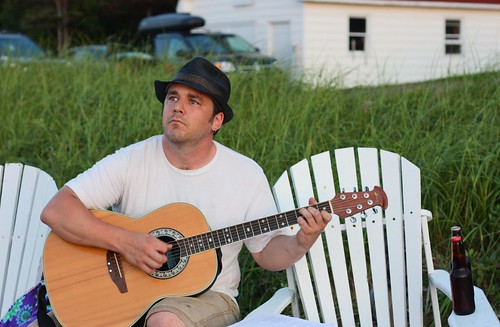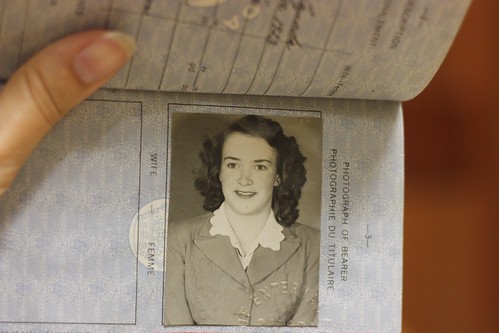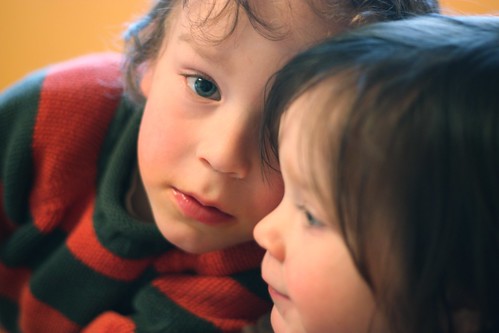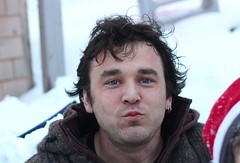end of summer and the days grow cool and the air opens up like a vast canvas, all possibility, whispering at me like a siren.
where do you want to go? i swear it hollers, cool breath on my neck. goosebumps rise in response. it does not bother to arch its eyebrows or its back to court me; it is too busy, too full with its own ripeness, rushing on ahead of the inevitable decay of November that we both know looms. i gasp and watch it race the horizon.
it is travelling season. i wave, limply, as it speeds by.
my travels will only be in the books and papers of my studies, this fall, and in the French worksheets my kids bring home from the new school which is only daycare but in my maternal mind probably feels more like school than real school will when they get there because they have now entered The System and this is the school building they will attend right through into kindergarten and beyond and straight on til morning and my addled Anglo mind can’t even comprend the damn “Information de votre Enfant” sheet i had to fill out so, it’s school.
the backpacks we grab in the morning are the kind with clean diapers and changes of underpants, the kind intended to come home at the end of the day with handprints and paintings. they are not the kind you have to bend to heft onto your person, the kind that you stuff until the straps bulge and beg for mercy and that you lug with you through unfamiliar streets almost as companion, your worldly goods and your tickle trunk both.
my real backpack – bright yellow, like autumn leaves – has lain unused for years now, stuffed under the suitcases that see occasional service for family trips or conferences.
in truth, it only ever made one autumn trip. my first, the virgin voyage, though i was old for a first-time traveller and virgin only in the provincialism i was as eager to shed as i had been the real deal ten years before.
a decade ago now, that first trip. i did not know then that autumn was the perfect time to travel. i know that only now, because i cannot go.
it was Ireland, the summer after, that brought the lesson home. heed my words: if you are travelling alone and you are a sociable sort by nature, keen to mix with locals and taste the culture in its less sanitized forms, do not choose high season for your wanderings.
Ireland is a tourist destination, a place that turns itself inside out come summer to present a smiling face to a world that lines its pockets in return. i do not say this with cynicism; it is simply a fact.
i should have known better because i am from one of these places too. we are all friendliness in July, here in PEI. but if you visit, you will only see our “parlour face,” our best self, all genuine friendliness and clannish closed-ness, a paradox. it is simply that we have only so much energy and there are so many crowding in to see whatever spectacle they have in mind of who we are. in high season, you will not really get to know us.
and so it was with me in most of Ireland.
i wandered streets and cobblestones, ducked into pubs, hitchhiked on the wrong side of the road. i struck up conversations with old men who lay half-prone on bus station benches, red-flowered noses far less poetic in person than in the storied romance of a nation’s manhood, self-sabotaged. mostly, i was alone. hostels in small Irish towns are not necessarily hotbeds of wild conversational nightlife. in Sligo, i had the run of the place but for one elderly gentleman in town for the night for a job interview. i settled into my chair with my tea, keen to chatter. he stared at me, took his teeth literally out of his mouth, and gummed “goo’nighd.”
chastened, i went to bed.
and so it went. all around the friendly, busy coast, i danced on the periphery of a culture i could not break into. then i got to Belfast.
if you ever need a straight dose of reality after a month of feeling like a bloody tourist no matter where you turn, head to Belfast. don’t mind the pipe bomb warnings or the grim, Dickensian buildings with their squat red-brick tops and their razor wire. go. walk. skip the Black Cab tour and take yourself up the Falls Road and down the Shankill. open your eyes to the human hands that painted the sectarian murals that decorate the brick. understand, this has been a paramilitary war zone for generations. know too, these are neighbourhoods, homes. the gap-toothed kids i met didn’t mind at all that i was taking pictures. but one wanted to know why i only saw the murals? why not take a picture of him in front of the fish shop?
there was only Kodachrome, then. the boy turned out blurry, and i felt i had lost something, forever.
Belfast, at least the summer i landed there, doesn’t have much of a tourist season.
i bellied up to the oak bar of a pub, watching the barman pour Guinness, noting the flick of the wrist, the art of the proper pour. i like watching people do what they do well.
a young man – not much more than a kid, really, smooth-cheeked – came up to me. we chatted. his namer was Conor. he had a Belfast accent to beat the band, all flattened vowels and dropped gerunds and i told him, laughing, that i was homesick for Irish music because where i am from the pubs are full of ta-deedly tunes and the long, sad ballads of the Olde Country. i had been in Asia for a year, nearly. this was as close as i could get to home.
and so he took me across the city that night, through alleys and down wide thoroughfares that were strangely empty, past the glorious Hotel Europa – the most bombed hotel in Europe, he informed me, and i asked if he’d ever been in it. he said no. and i marvelled at how we end up inside our skins. i was as seamless a visual fit here – a foot in each world, my Scottish-Irish mongrel genes marked all over my freckled, fair face – as i’d been anywhere in my life. and yet i could, with the impunity and innocence of a tourist, go places that he could not dream of setting foot.
i realized in that moment that even if i tried, i’d never see the city as anything but an outsider.
he took me to a den of a bar, nestled down low in the ground, dank and warm and strangely welcoming. there was an upright piano in the corner, and a man with that most Irish of instruments, the bouzouki. he sang, and then my friend and another man got up and sang too, an old ballad called My Bonny Highwayman, and the liquor made me brave and i regaled them with all the verses of Farewell to Nova Scotia and they were remarkably kind.
there were perhaps six people in the place.
while i was singing, a man came in, older than the rest of us twenty-somethings by perhaps fifteen years. he stood watching, and i saw Conor nod and go over and shake his hand.
he was a bear of a man, in a long, black trenchcoat. the night was humid. his hair was longish, and wild, and the beard to match and his sharp blue eyes made me think at first of Rasputin. i bowed. they clapped. and then i walked up at the very moment Conor asked the bear how he was, and the man’s face crumpled. it was no time to introduce myself; instead, tipsy and far from home, i took his arm, his giant arm.
sit, i commanded.
we sat, the three of us, in a round corner booth under a single incandescent bulb. the big man talked.
his love had died. his wife – or not really his wife, he conceded, but his partner of twenty years, older than him, his trooo luf – had died of cancer perhaps a month before. i have never seen a man so big seem so small. words and sorrow and shame spilled from him like music, about how her body wasted, and he was so afraid, and he had not known what to say and in the end it was her who lay beside him and told him it would be alright.
i did not know what to say. i asked her name. it was Diane. i no longer remember his.
we sat, and the drinks kept coming, and then as suddenly as he had come, he was off, paying the tab as he went. he enclosed me in his arms, in that greatcoat, for a moment before he left, and i think i touched his face because he had touched me, raw and deep. he shook Conor’s hand again, and he was gone.
the music was over. we sat, suddenly in silence, and i realized i had no idea how to get back to the hostel. i looked at my host, curious.
who was he? i asked. how do you know him?
everybody knows him, Conor answered. he’s a legend. he’s one of the big boys; he’s been around here since the old days. my brothers knew him.
then, with a half-grin, because my blank face must’ve given me away, he said he’s a knee-capper, girl, an enforcer. he’s IRA. IRA? you know?
i must’ve blinked. IRA. right. i knew. i’d known the whole time i was in the city that a fissure ran beneath it, one i couldn’t see. i’d walked the streets, shot my photo essay, humming Protestant hymns from my childhood when i’d noticed my raincoat was bright Republican green. but i hadn’t understood. i had been a tourist, nothing more.
and then i had sat down with a broken man, and for a minute, i’d seen the city as more than an outsider.
***
Conor walked me home. i never saw him again, or the bear of a man who did terrible things, and grieved Diane, his woman.
my life is settled now, and simpler. but when the wind comes up cool and brisk in fall, it is those messiest, rawest, most human moments of travel and dislocation that i long for, that take me outside my skin and give me wanderlust again.




